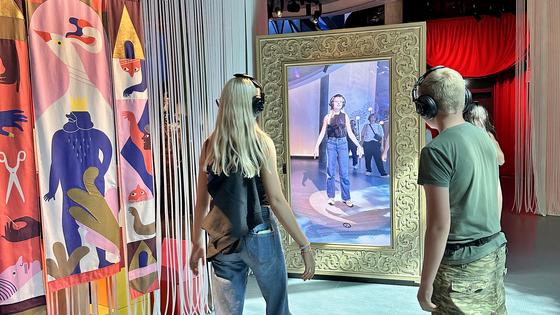Rick Steves’ Europe: Denmark's countryside delights, from Viking ships to fairy tales
Copenhagen is a thriving metropolis and the main attraction in Denmark. But a trip here isn't complete without a swing through the cute Danish countryside. In under two hours, you can time-travel from modern Copenhagen to a 10th-century Viking ship, 17th-century castle, or 19th-century fairy tale.
While today's Denmark is small – roughly twice the size of Massachusetts – at one time the Danish empire included all of Scandinavia and stretched into Germany. A reminder of that power is the stunning Frederiksborg Castle, floating serenely on an island in the middle of a lake. An hour north of Copenhagen, Frederiksborg is considered by many to be the grandest castle in Scandinavia – the Danish Versailles.
Built in the early 1600s, Frederiksborg was the castle of the mighty King Christian IV. Today the castle houses the Museum of National History, filled with countless musty paintings that create a fascinating scrapbook of Danish history from 1500 until today.
Frederiksborg still gives visitors a feel for what it was like in its heyday. The suitably regal entry is ringed by a moat designed more for swans than defense. The royal apartments exude royal opulence. The Great Hall is where Christian IV threw lavish parties, with the orchestra playing from their perch above.
If you prefer Rauschenberg to royalty, a trip to the Louisiana is a must. About 30 minutes north of Copenhagen, Scandinavia’s most-raved-about modern-art museum is a holistic place that masterfully mixes art, architecture, and landscape. A delightful sculpture garden sprawls through the grounds, downhill toward the sea. Inside, the ever-changing collection displays post-1945 art, including Picassos, Warhols, and Hockneys.
While Copenhagen is Denmark's political and cultural capital, its historic capital is located about 20 miles to the west in the town of Roskilde. Eight hundred years ago, this was the seat of Denmark's royalty and its center of power. Today, the town is famous for hosting northern Europe's biggest rock festival each July, featuring such acts as Kendrick Lamar, Bruno Mars, and Dua Lipa.
But long before Coldplay came to play, Christians came to pray. Roskilde's centerpiece is its imposing 12th-century, twin-spired cathedral. This stately old church, with fine wood carvings and a great 16th-century organ, is the resting place of 40 kings and queens.
After the Reformation gutted the church of its saints and Marys, it left a blank slate for Danish royals to fill with their tombs. The oldest tomb, from 1397, holds Queen Margrethe I, whose strong leadership and clever negotiating helped unite the three Nordic Kingdoms. Today, a spot has been reserved for its next resident – Margrethe II (who reigned as queen from 1972 until her abdication earlier this year); she teamed up with an artist to design her own tomb.
A short walk from the cathedral leads to Roskilde's waterfront and the excellent Viking Ship Museum, highlighted by five full-size vessels. These ships were deliberately sunk a thousand years ago to block the entrance to the strategic and rich city. In 1962 they were brought up from their salty grave.
The big, ocean-going trade ship is similar to the ship Leif Eriksson took to America 1,000 years ago, though this one was likely used to carry Viking emigrants – with their families and the entire farm – to Iceland and later on to the New World. The skinnier, faster longship, powered by about two dozen oarsmen, terrorized much of Europe back when people dreaded those rampaging Norsemen.
The museum's interactive exhibits are great for kids. Craftspeople demonstrate boatbuilding, rope-making, woodcarving, and other traditional skills, while a replica Viking ship sails around Roskilde's harbor, giving visitors a taste of what it was like to ride in a vessel built by these fabled masters of the sea.
About an hour west of Roskilde, the industrial city of Odense is Denmark's third-largest metropolis. Tourists come here to celebrate its famous son, Hans Christian Andersen, whom the Danes call simply H.C. (“hoe see”).
Hans Christian Andersen House is a highlight of an Odense visit. As visitors move through the exhibit, the English-language audioguide educates and entertains. From travel souvenirs (including a length of rope he traveled with, just in case his hotel room caught fire and he needed to escape) to his charming paper cutout illustrations, the collection offers insight into Andersen’s personality – warts and all. Along with the artifacts are artistic installations inspired by 12 of Andersen’s best-known fairy tales. And Andersen's tiny birthplace, incorporated into a corner of the otherwise slick museum, is a reminder of how this poor shoemaker's son's talent raised him above the social class he was born to.
From daunting ships to regal castles, Denmark is a land of fairy tales. Each time I visit, it’s like reading another page of a book that I don’t want to end.
========
(Rick Steves (www.ricksteves.com) writes European guidebooks, hosts travel shows on public TV and radio, and organizes European tours. This column revisits some of Rick's favorite places over the past two decades. You can email Rick at rick@ricksteves.com and follow his blog on Facebook.)
©2024 Rick Steves. Distributed by Tribune Content Agency, LLC.
(c)2024 RICK STEVES DISTRIBUTED BY TRIBUNE MEDIA SERVICES, INC.














Comments